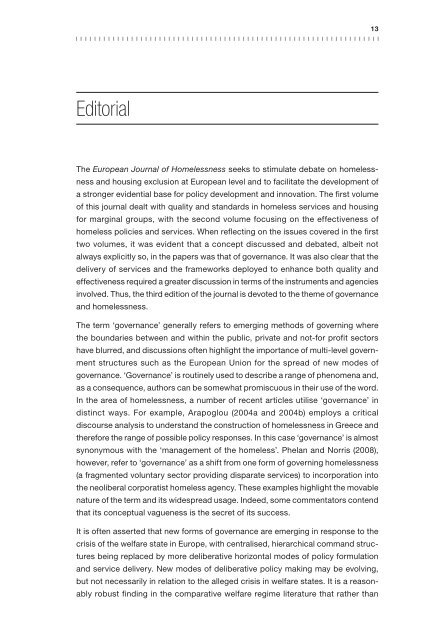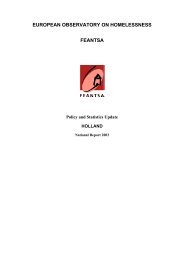- Page 1 and 2: European Observatory on Homelessnes
- Page 3 and 4: Contributors Mike Allen Focus Irela
- Page 5 and 6: Hugh Frazer Department of Applied S
- Page 7 and 8: International Advisory Committee of
- Page 9 and 10: Content Policy Evaluation Hannele T
- Page 11: Foreword René KNEIP, President of
- Page 15 and 16: Editorial required compared to more
- Page 17 and 18: Editorial Benjaminsen and Busch-Gee
- Page 19 and 20: Editorial state regulation of margi
- Page 21: Part A 21 Articles
- Page 24 and 25: 24 European Journal of Homelessness
- Page 26 and 27: 26 European Journal of Homelessness
- Page 28 and 29: 28 European Journal of Homelessness
- Page 30 and 31: 30 European Journal of Homelessness
- Page 32 and 33: 32 European Journal of Homelessness
- Page 34 and 35: 34 European Journal of Homelessness
- Page 36 and 37: 36 European Journal of Homelessness
- Page 38 and 39: 38 European Journal of Homelessness
- Page 40 and 41: 40 European Journal of Homelessness
- Page 42 and 43: 42 European Journal of Homelessness
- Page 44 and 45: 44 European Journal of Homelessness
- Page 46 and 47: 46 European Journal of Homelessness
- Page 48 and 49: 48 European Journal of Homelessness
- Page 50 and 51: 50 European Journal of Homelessness
- Page 53 and 54: Part A _ Articles The Drafting of t
- Page 55 and 56: Part A _ Articles strategy on homel
- Page 57 and 58: Part A _ Articles need for a better
- Page 59 and 60: Part A _ Articles services), promot
- Page 61 and 62: Part A _ Articles Monitoring and Ev
- Page 63 and 64:
Part A _ Articles The need to adopt
- Page 65 and 66:
Part A _ Articles Figure 1 : Collab
- Page 67 and 68:
Part A _ Articles • Stabilisation
- Page 69 and 70:
Part A _ Articles • Sectoral meet
- Page 71 and 72:
Part A _ Articles • E-mailing was
- Page 73 and 74:
Part A _ Articles emerged around, f
- Page 75 and 76:
Part A _ Articles Increasing Access
- Page 77 and 78:
Part A _ Articles driving force, in
- Page 79 and 80:
Part A _ Articles income households
- Page 81 and 82:
Part A _ Articles in a property. Th
- Page 83 and 84:
Part A _ Articles Levels of homeles
- Page 85 and 86:
Part A _ Articles considered ‘set
- Page 87 and 88:
Part A _ Articles Table 2 : Key ele
- Page 89 and 90:
Part A _ Articles In England there
- Page 91 and 92:
Part A _ Articles to plan for a mix
- Page 93 and 94:
Part A _ Articles ence of applying
- Page 95 and 96:
Part A _ Articles each year (63,000
- Page 97 and 98:
Part A _ Articles > > References Al
- Page 99 and 100:
Part A _ Articles Lacharme, B. (200
- Page 102 and 103:
102 European Journal of Homelessnes
- Page 104 and 105:
104 European Journal of Homelessnes
- Page 106 and 107:
106 European Journal of Homelessnes
- Page 108 and 109:
108 European Journal of Homelessnes
- Page 110 and 111:
110 European Journal of Homelessnes
- Page 112 and 113:
112 European Journal of Homelessnes
- Page 114 and 115:
114 European Journal of Homelessnes
- Page 116 and 117:
116 European Journal of Homelessnes
- Page 118 and 119:
118 European Journal of Homelessnes
- Page 120 and 121:
120 European Journal of Homelessnes
- Page 122 and 123:
122 European Journal of Homelessnes
- Page 124 and 125:
124 European Journal of Homelessnes
- Page 127 and 128:
Part A _ Articles Labour Market Ref
- Page 129 and 130:
Part A _ Articles 129 size, Germany
- Page 131 and 132:
Part A _ Articles 131 excluded peop
- Page 133 and 134:
Part A _ Articles Germany 133 In Ge
- Page 135 and 136:
Part A _ Articles unemployed for le
- Page 137 and 138:
Part A _ Articles 137 reform of the
- Page 139 and 140:
Part A _ Articles 139 show a decrea
- Page 141 and 142:
Part A _ Articles 141 al., 2007). I
- Page 143 and 144:
Part A _ Articles 143 cent over a p
- Page 145 and 146:
Part A _ Articles age of twenty-fiv
- Page 147 and 148:
Part A _ Articles 147 divergence in
- Page 149 and 150:
Part A _ Articles > > References AK
- Page 151 and 152:
Part A _ Articles DIW - Deutsches I
- Page 153:
Part A _ Articles Statistics Denmar
- Page 156 and 157:
156 European Journal of Homelessnes
- Page 158 and 159:
158 European Journal of Homelessnes
- Page 160 and 161:
160 European Journal of Homelessnes
- Page 162 and 163:
162 European Journal of Homelessnes
- Page 164 and 165:
164 European Journal of Homelessnes
- Page 166 and 167:
166 European Journal of Homelessnes
- Page 168 and 169:
168 European Journal of Homelessnes
- Page 170 and 171:
170 European Journal of Homelessnes
- Page 172 and 173:
172 European Journal of Homelessnes
- Page 174 and 175:
174 European Journal of Homelessnes
- Page 176 and 177:
176 European Journal of Homelessnes
- Page 179:
Part B 179 Policy Evaluation
- Page 182 and 183:
182 European Journal of Homelessnes
- Page 184 and 185:
184 European Journal of Homelessnes
- Page 186 and 187:
186 European Journal of Homelessnes
- Page 188 and 189:
188 European Journal of Homelessnes
- Page 190 and 191:
190 European Journal of Homelessnes
- Page 192 and 193:
192 European Journal of Homelessnes
- Page 194 and 195:
194 European Journal of Homelessnes
- Page 196 and 197:
196 European Journal of Homelessnes
- Page 198 and 199:
198 European Journal of Homelessnes
- Page 201 and 202:
Part B _ Evaluation The Development
- Page 203 and 204:
Part B _ Evaluation 203 strategy in
- Page 205 and 206:
Part B _ Evaluation 205 The process
- Page 207 and 208:
Part B _ Evaluation 207 conference
- Page 209 and 210:
Part B _ Evaluation 209 and draft p
- Page 211 and 212:
Part B _ Evaluation Inclusion 2008-
- Page 213 and 214:
Part B _ Evaluation > > References
- Page 215 and 216:
Part B _ Evaluation Social Rental A
- Page 217 and 218:
Part B _ Evaluation 217 ‘official
- Page 219 and 220:
Part B _ Evaluation Profile of the
- Page 221 and 222:
Part B _ Evaluation 221 different a
- Page 223 and 224:
Part B _ Evaluation Future collabor
- Page 225 and 226:
Part B _ Evaluation 225 renders reg
- Page 227 and 228:
Part B _ Evaluation 227 A second co
- Page 229 and 230:
Part B _ Evaluation Huyse, L. (2003
- Page 231 and 232:
Part B _ Evaluation Governance and
- Page 233 and 234:
Part B _ Evaluation The Supporting
- Page 235 and 236:
Part B _ Evaluation Table 1 : The S
- Page 237 and 238:
Part B _ Evaluation 237 accountable
- Page 239 and 240:
Part B _ Evaluation 239 became a me
- Page 241 and 242:
Part B _ Evaluation Conclusion 241
- Page 243:
Part B _ Evaluation Huxham, C., Van
- Page 247 and 248:
Part C _ Think Pieces Governing Mar
- Page 249 and 250:
Part C _ Think Pieces Family Interv
- Page 251 and 252:
Part C _ Think Pieces 251 apparent
- Page 253 and 254:
Part C _ Think Pieces 253 long-term
- Page 255 and 256:
Part C _ Think Pieces 255 investmen
- Page 257 and 258:
Part C _ Think Pieces > > Reference
- Page 259 and 260:
Part C _ Think Pieces Parr, S. (200
- Page 261 and 262:
Part C _ Think Pieces Homelessness
- Page 263 and 264:
Part C _ Think Pieces 5. 6. 263 the
- Page 265 and 266:
Part C _ Think Pieces 265 lessness
- Page 267 and 268:
Part C _ Think Pieces 2002 ; Knight
- Page 269 and 270:
Part C _ Think Pieces 269 I have ar
- Page 271 and 272:
Part C _ Think Pieces > > Reference
- Page 273:
Part C _ Think Pieces Savelsberg, J
- Page 276 and 277:
276 European Journal of Homelessnes
- Page 278 and 279:
278 European Journal of Homelessnes
- Page 280 and 281:
280 European Journal of Homelessnes
- Page 282 and 283:
282 European Journal of Homelessnes
- Page 284 and 285:
284 European Journal of Homelessnes
- Page 286 and 287:
286 European Journal of Homelessnes
- Page 288 and 289:
288 European Journal of Homelessnes
- Page 290 and 291:
290 European Journal of Homelessnes
- Page 292 and 293:
292 European Journal of Homelessnes
- Page 294 and 295:
294 European Journal of Homelessnes
- Page 296 and 297:
296 European Journal of Homelessnes
- Page 298 and 299:
298 European Journal of Homelessnes
- Page 301 and 302:
Part C _ Think Pieces How to Use th
- Page 303 and 304:
Part C _ Think Pieces 303 overarchi
- Page 305 and 306:
Part C _ Think Pieces 305 result th
- Page 307 and 308:
Part C _ Think Pieces Relations bet
- Page 309 and 310:
Part C _ Think Pieces 309 For the E
- Page 311 and 312:
Part C _ Think Pieces 311 results o
- Page 313 and 314:
Part C _ Think Pieces 313 lessness.
- Page 315 and 316:
Part C _ Think Pieces 315 If this s
- Page 317 and 318:
Part C _ Think Pieces Response to
- Page 319 and 320:
Part C _ Think Pieces 319 I would t
- Page 321 and 322:
Part C _ Think Pieces 321 tally wit
- Page 323 and 324:
Part C _ Think Pieces Role of Netwo
- Page 325 and 326:
Part C _ Think Pieces • • • 3
- Page 327:
Part C _ Think Pieces > > Reference
- Page 331 and 332:
Part D _ Reviews Pedro Cabrera, Mar
- Page 333:
Part D _ Reviews 333 Finally, it is
- Page 336 and 337:
336 European Journal of Homelessnes
- Page 338 and 339:
338 European Journal of Homelessnes
- Page 340 and 341:
340 European Journal of Homelessnes
- Page 343 and 344:
Part D _ Reviews Deborah Quilgars,
- Page 345 and 346:
Part D _ Reviews 345 were violent r
- Page 347 and 348:
Part D _ Reviews Suzanne Fitzpatric
- Page 349 and 350:
Part D _ Reviews 349 low-paid or in
- Page 351 and 352:
Part D _ Reviews 351 research. Thos
- Page 354:
European Observatory on Homelessnes




